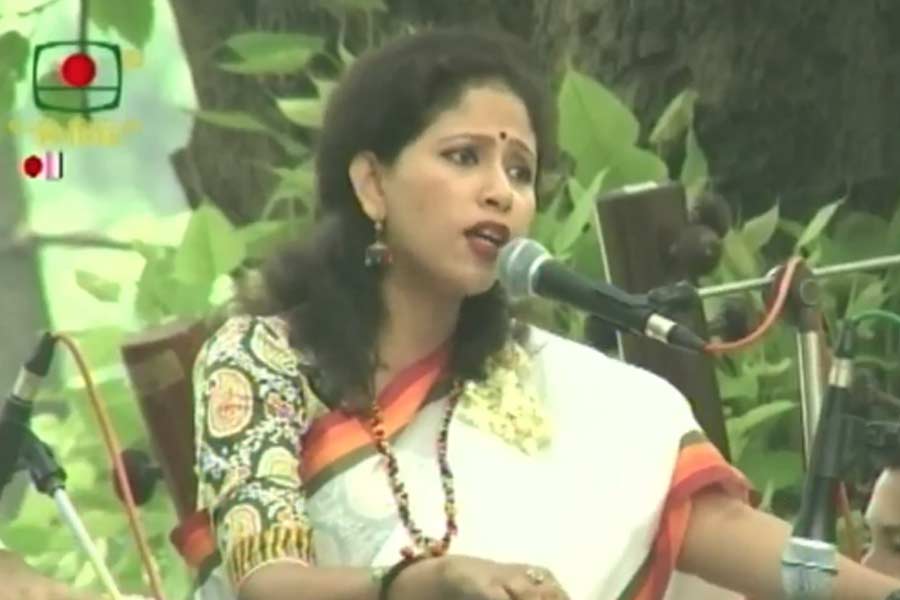
Published :
Updated :

Pahela Baishakh, the first day of Bengali New Year-1431, is being celebrated across the country today with festivity, upholding the rich cultural values and rituals of the Bangalees.
A huge number of people are expected to join the "Nabo Barsho" festivities across the country, particularly in the capital city.
Pahela Baishakh is one of the most colourful festivals through which the Bangalees bid farewell to the old year and welcome the New Year.
On this occasion, people from all walks of life wear traditional Bengali dresses. Young women wear white sarees with red borders and adorn themselves with bangles, flowers and "tips" while men wear white pyjamas and panjabi or kurta.
The programmes of the day will begin in the capital with the musical soiree of Chhayanat, a leading cultural organisation of the country at Ramna Batamul at dawn.
Traditional Mangal Shobhajatra will be brought out from Dhaka University (DU) Fine Arts Faculty premises in the morning.
Bangladesh Television, Bangladesh Betar and private television channels will live broadcast the programmes.
Mangal Shobhajatra will also be brought out at divisional, district and upazila levels to reach the traditional programme to the grassroots as it has earned the international recognition. Mangal Shobhajatra was inscribed on UNESCO's Representative List of Intangible Cultural Heritage of Humanity in 2016.
Business communities, especially in the rural areas, are ready to open their traditional 'Halkhata', new account books. On the day, traders also offer sweets to customers.
President Mohammed Shahabuddin and Prime Minister Sheikh Hasina issued separate messages greeting the countrymen on the eve of the Pahela Baishakh in the yesterday.
Different government and non-government organisations, socio-cultural platforms, including Bangladesh Shilpakala Academy, Bangladesh Shishu Academy, Bangla Academy, Department of Public Libraries, the National Museum,Kabi Nazrul Institute, Copyright Office, National Book Centre, Bangladesh Small and Cottage Industries Corporation (BSCIC), the Department of Archivesand Library and Dhaka University will hold various programmes along with seminars, exhibitions and quiz, essay and art competitions marking the festival.
Besides, local administration will organize quiz competitions, cultural programmes and folk fairs.
The city people usually start the day with the traditional breakfast of 'panta bhat' (soaked rice), green chili, onion and fried fish at Ramna Park, Suhrawardy Uddyan, Dhaka University Campus, Rabindra Sarobor at Dhanmondi and other amusement places.
On the occasion, all museum and archaeological sites will remain open for all while children, students, people with disabilities and autism will be allowed to visit the museum free of cost.
On the occasion, improved traditional food will be distributed to jail inmates, patients in hospitals and orphanages.
Bangladesh missions abroad will also organise different programmes to welcome the Bengali New Year.
The law enforcement agencies will take extensive security measures across the country so that people could celebrate the day.
The day is a public holiday.
Bangladesh Television, Bangladesh Betar and other private TV and radio channels will air special programmes highlighting the significance of Pahela Baishakh.
Some historians attribute the Bengali calendar to the seventh century King Shashanka, which was later modified by Mughal Emperor Akbar for the purpose of tax collection.
During the Mughal rule, land taxes were collected from Bengali people according to the Islamic Hijri calendar. This calendar was a lunar calendar, and its new year did not coincide with the solar agricultural cycles.
Akbar asked the royal astronomer Fathullah Shirazi to create a new calendar by combining the lunar Islamic calendar and solar Hindu calendar already in use, and this was known as Fasholi shan (harvest calendar).


 For all latest news, follow The Financial Express Google News channel.
For all latest news, follow The Financial Express Google News channel.